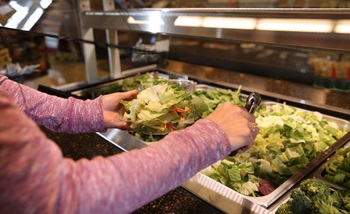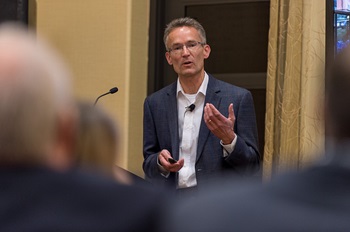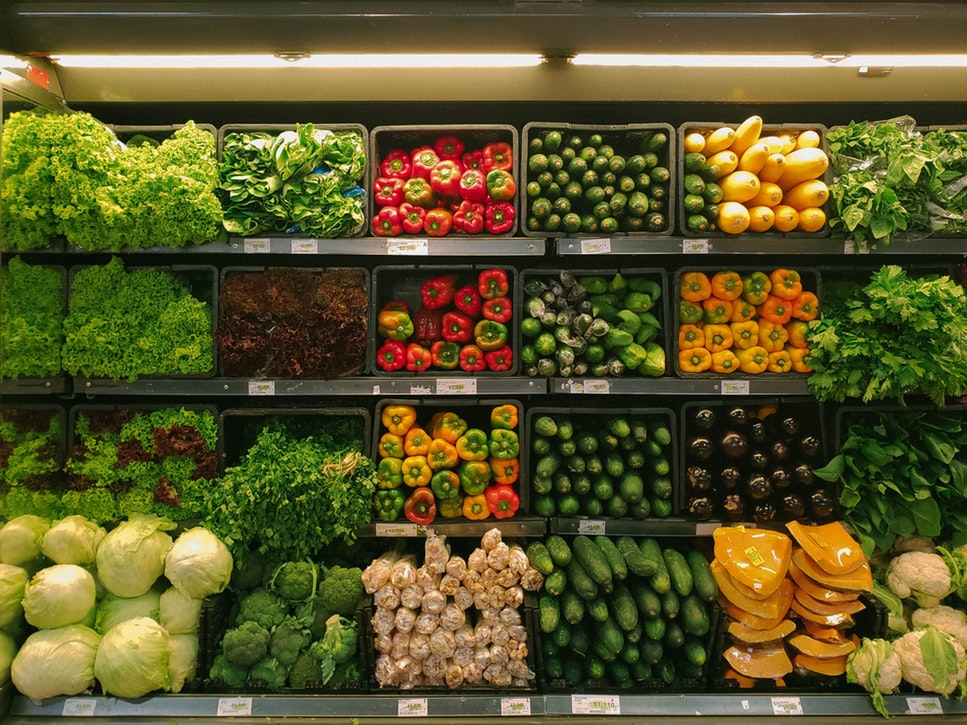By: Doug Baker, Vice President Industry Relations-Private Brands, Technology, Food Marketing Institute

Throughout his four+ years directing Google’s global corporate meals program, Michiel Bakker, director of global food services, noted that “food at work really works” – in terms of building culture, happiness and supporting health and wellness among its employees. Mr. Bakker explained during his Midwinter Executive Conference presentation that the 165,000 meals served per day to 110,000 individuals is certainly an investment in the company’s overall mission to incubate creativity and feed talent.
The Google Food program has implications for food retailers’ own employees and it also offers insights into new merchandising and sustainable partnership opportunities. In fact, this program is a microcosm of what retailers are trying to do with their health and wellness initiatives. Unfortunately, they can’t offer the food for free.
Mr. Bakker said that many employees eat better at work than they do at home because the program enables individuals to make personal, informed food choices for sustainable lifestyle, but Google also caters to a time-deprived and younger generation that doesn’t always have the right skills to make the food at home. The same kitchens that feed Google employees support staff in building culinary skill sets by offering basic cooking classes and even team building events.
 He asserted that better-for-you foods should be easiest to access when you offer free food. However, he cautioned not to take away treats, but to instead make the alternative better, more attractive, easier and convenient. Citing Google’s user insights for its feeding program, he noted several trends impacting Google Food’s design: the growing eating (not cooking) culture; the idea that we’re all experts when it comes to food; the desire to create digital food experiences; personalization; grazing, instead of three-squares –a-day; the constant struggle of what we say versus what we actually do; and how people are making tradeoffs.
He asserted that better-for-you foods should be easiest to access when you offer free food. However, he cautioned not to take away treats, but to instead make the alternative better, more attractive, easier and convenient. Citing Google’s user insights for its feeding program, he noted several trends impacting Google Food’s design: the growing eating (not cooking) culture; the idea that we’re all experts when it comes to food; the desire to create digital food experiences; personalization; grazing, instead of three-squares –a-day; the constant struggle of what we say versus what we actually do; and how people are making tradeoffs.
The program is branded Google, but executed by vendor partners and franchisees. Mr. Bakker and his team define expectations and the vendor program brings it to life. Globally, there’s an expectation for a similar approach and experience among all the Google offices. Essentially, he’s managing globally branded franchises that offer sustainable solutions to corporate feeding and nutrition programs.
Mr. Bakker offered several action items for the food retail audience at our conference when implementing their own food-at-work program:
- Investment or cost: How could you afford not to invest?
- Provide support to users
- Food care and health care are intertwined
- Flavor rules
- Make the alternative food choice taste better, more attractive, easier, convenient
- Culinarians are key, so do not underestimate the chef
- Act. Launch.


 Industry Topics address your specific area of expertise with resources, reports, events and more.
Industry Topics address your specific area of expertise with resources, reports, events and more.
 Our Research covers consumer behavior and retail operation benchmarks so you can make informed business decisions.
Our Research covers consumer behavior and retail operation benchmarks so you can make informed business decisions.
 Events and Education including online and in-person help you advance your food retail career.
Events and Education including online and in-person help you advance your food retail career.
 Food Safety training, resources and guidance that help you create a company food safety culture.
Food Safety training, resources and guidance that help you create a company food safety culture.
 Government Affairs work — federal and state — on the latest food industry policy, regulatory and legislative issues.
Government Affairs work — federal and state — on the latest food industry policy, regulatory and legislative issues.
 Get Involved. From industry awards to newsletters and committees, these resources help you take advantage of your membership.
Get Involved. From industry awards to newsletters and committees, these resources help you take advantage of your membership.
 Best practices, guidance documents, infographics, signage and more for the food industry on the COVID-19 pandemic.
Best practices, guidance documents, infographics, signage and more for the food industry on the COVID-19 pandemic.
